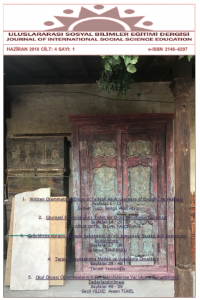Abstract
Tarihi geçmişi insanoğlunun var oluşuna kadar uzanan
çeviri işlemi günümüzde toplumları ve bireyleri birbirine yaklaştıran ve onlar
arasında her türlü diyalogun ya da iletişimin kurulmasını sağlayan vazgeçilmez
bir etkinliktir. Çok yönlü, karmaşık ve disiplinlerarası bir olgudur ve etkin
olduğu alanlardan birisi de edebi çeviridir. Hangi dilde yazılmış olursa olsun,
edebi eserler çeviri sayesinde insanoğlunun ortak malı olmaktadır. Kaynak dilde
yazılan edebi bir eserin erek dile çevirisiyle, sadece sözcük bilgisi ve
dilbilgisi kurallarının aktarılması değil aynı zamanda bir kültürün anlaşılır
bir şekilde aktarılmasıdır. Bu çalışmada Cumhuriyet dönemi ilk yıllarındaki
gerçekçi edebiyatın öncülüğünü yapan yazar ve şair Sabahattin Ali’nin
İçimizdeki Şeytan adlı eserindeki “dini ögeler”, deyim ve atasözleri” ve “özel
isimlerin” Itamar Even-Zohar’ın çoğuldizge kuramı ışığında Almancaya nasıl
aktarıldığı incelenecektir. Yapılan çevirinin Çoğul Dizge Kuramına göre
“yeterli” mi yoksa “kabul edilebilir” mi olduğu gözlemlenecektir.
References
- Aksoy, N.B. (2002). Geçmişten günümüze yazın çevirisi. Ankara, İmge Kitabevi.
- Ali, S. (2014). İçimizdeki şeytan. İstanbul, Yapı Kredi Yayınları.
- Ali S. (2007). Der Dämon in uns. [Çev. Ute Birgi-Knellessen]. Zürich, Unionsverlag.
- Boztaş, İ. (1992). Çeviri, çeviride eşdeğerlilik ve dilbilim: Dilbilim 20.yıl yazıları. Ankara, Karaca Dil Kursu Yayınları.
- Göktürk, A. (1994). Çeviri: Dillerin dili. İstanbul, Yapı Kredi Yay.
- Gürçağlar, Ş. T. (2016). Çevirinin ABC’si. İstanbul, Say Yayınları.
- Ricoeur, P. (2008). Çeviri üzerine. [Çev. Sündüs Öztürk Kasar]. İstanbul, Yapı Kredi Yayınları.
- Steuerwald, K. (1998). Almanca-Türkçe sözlük. İstanbul, ABC Yayınevi.
- Steuerwald, K. (1998). Türkçe-Almanca sözlük. İstanbul, ABC Yayınevi.
- TDK, (2011). Türkçe sözlük. Ankara, Türk Dil Kurumu Yayınları.
- TDK, (1978). Atasözleri ve deyimler sözlüğü. Ankara, Türk Dil Kurumu Yayınları.
- Vardar, B. (1981). Çeviri konuşmaları, Yazko Çeviri, 2, 172-173.
- Yazıcı, M.(2005). Çeviribilimin temel kavram ve kuralları. İstanbul, Multilingual Yayınları.
Abstract
Translation, the story of
which extends to the existence of mankind, is an essential activity which
brings societies and individuals closer and allows the creation of dialogue and
all kinds of communication. Translation is a multifaceted, complex, and
interdisciplinary phenomenon and one of the areas it is influential is
literature. Regardless of the language they are written in, literary works
become the common property of mankind thanks to translation. The translation of
a literary text from the source language into target language is not simply a
matter of transferring the vocabulary and grammar but it is also a process of
transferring the culture in a comprehensible way. In this study, “The Devil
Within Us”, a book written by Sabahattin Ali, who is one of the pioneers of
realistic literature during the era of the foundation of the Turkish Republic,
will be analysed in terms of the translation of “religious elements”, “idioms
and proverbs”, and “proper nouns” into German following Itamar Even-Zohar’s
polysystem theory. The author will investigate whether the translation of this
literary text into German is “adequate” or “acceptable” in the light of
polysystem theory.
References
- Aksoy, N.B. (2002). Geçmişten günümüze yazın çevirisi. Ankara, İmge Kitabevi.
- Ali, S. (2014). İçimizdeki şeytan. İstanbul, Yapı Kredi Yayınları.
- Ali S. (2007). Der Dämon in uns. [Çev. Ute Birgi-Knellessen]. Zürich, Unionsverlag.
- Boztaş, İ. (1992). Çeviri, çeviride eşdeğerlilik ve dilbilim: Dilbilim 20.yıl yazıları. Ankara, Karaca Dil Kursu Yayınları.
- Göktürk, A. (1994). Çeviri: Dillerin dili. İstanbul, Yapı Kredi Yay.
- Gürçağlar, Ş. T. (2016). Çevirinin ABC’si. İstanbul, Say Yayınları.
- Ricoeur, P. (2008). Çeviri üzerine. [Çev. Sündüs Öztürk Kasar]. İstanbul, Yapı Kredi Yayınları.
- Steuerwald, K. (1998). Almanca-Türkçe sözlük. İstanbul, ABC Yayınevi.
- Steuerwald, K. (1998). Türkçe-Almanca sözlük. İstanbul, ABC Yayınevi.
- TDK, (2011). Türkçe sözlük. Ankara, Türk Dil Kurumu Yayınları.
- TDK, (1978). Atasözleri ve deyimler sözlüğü. Ankara, Türk Dil Kurumu Yayınları.
- Vardar, B. (1981). Çeviri konuşmaları, Yazko Çeviri, 2, 172-173.
- Yazıcı, M.(2005). Çeviribilimin temel kavram ve kuralları. İstanbul, Multilingual Yayınları.
Details
| Primary Language | Turkish |
|---|---|
| Subjects | Studies on Education |
| Journal Section | Makaleler |
| Authors | |
| Publication Date | June 30, 2018 |
| Submission Date | April 9, 2018 |
| Acceptance Date | May 6, 2018 |
| Published in Issue | Year 2018 Volume: 4 Issue: 1 |
Cite
All papers published in the journal are licensed under the Creative Commons Attribution-NonCommercial 4.0 International

